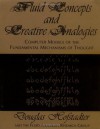251
Followers
4
Following
Manny Rayner's book reviews
I love reviewing books - have been doing it at Goodreads, but considering moving here.
Currently reading
The Greatest Show On Earth: The Evidence For Evolution
R in Action
Fluid Concepts and Creative Analogies
McGee on Food and Cooking: An Encyclopedia of Kitchen Science, History and Culture
Epistemic Dimensions of Personhood
Pattern Recognition and Machine Learning (Information Science and Statistics)
Relativity, Thermodynamics and Cosmology
The Cambridge Handbook of Second Language Acquisition
Expert Game
 So here's the gist of a conversation I had the other day with notgettingenough. I had been musing over what the best strategy might be for playing out dead endings like King + Rook versus King + Rook in internet speed chess games. Needless to say, in serious (long time-limit) chess, people would immediately shake hands and agree the game drawn. But in a three minute game, you often have so little time left that you can reasonably hope to win on the clock. King + Rook + 15 seconds versus King + Rook + 8 seconds offers excellent winning chances.
So here's the gist of a conversation I had the other day with notgettingenough. I had been musing over what the best strategy might be for playing out dead endings like King + Rook versus King + Rook in internet speed chess games. Needless to say, in serious (long time-limit) chess, people would immediately shake hands and agree the game drawn. But in a three minute game, you often have so little time left that you can reasonably hope to win on the clock. King + Rook + 15 seconds versus King + Rook + 8 seconds offers excellent winning chances.It should be evident that endings like these do not at all resemble ordinary chess. They are more like video games, and much depends on good hand-eye coordination; it's possible to win simply by moving fast. An important point which follows from this is that one should avoid making long moves. A short move - preferably a move to an adjacent square - can be executed more quickly. Another point is the importance of checks. If you check your opponent, they probably have to move their King, and unless they're anticipating it they will lose time moving their mouse to the right place on the screen.
But there are some strategic principles as well. If you can manage to take all your opponent's pieces, the rules say that you don't lose, even if you run out of time; at worst, you'll draw. So in King + Rook versus King + Rook, a defensive scheme is to try and take the opponent's Rook. You place your own Rook so that it's attacking your opponent's Rook, even if your Rook is unguarded. If he's alert, he'll take it. But if he's playing short, quick moves on autopilot, he may not react, in which case you can take him.
Having got this far, it occurred to us that the situation has some points in common with certain card-play situations discussed in Reese's book, where he shows that best play consists of choosing randomly between two alternatives in a certain ratio; perhaps you should choose alternative 1 twice as often as alternative 2. In the chess case, that certainly seems correct. If your opponent knows you'll try the feint where you hang your Rook and try to take his, he'll wait for you to do it and then pounce. But if your plan is to do it randomly every now and then, it's not so clear what he should do. Making quick, short moves might lose a Rook, but watching out for your trick will definitely lose time. What are the optimal ratios, though? And how do they depend on the clock times?
This was as far as we got before Not started complaining about the dreadful state that chess has now got itself into. What would Botvinnik have said? She has a point. But I still think it's interesting. If someone reading this has a good enough knowledge of von Neumann-Morgenstern game theory, they may want to try and carry out an exact analysis.
____________________________________________
Postscript after reading Bullet Chess. Emir was absolutely right to suggest looking at it, but in fact Nakamura doesn't consider this kind of position. So it's still a wide open opportunity for anyone who's interested in becoming one of the pioneers of Bullet Endgame Theory.











